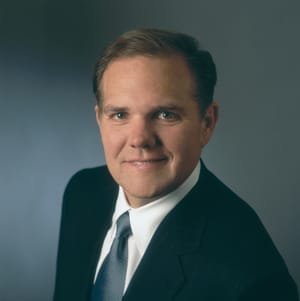Omnicom Group CFO Randall Weisenburger, WG’87, shows his commitment to Wharton, and the Wharton Interactive Media Initiative (WIMI), as concretely as he can–via the direct involvement of more than a dozen Omnicom-owned companies in WIMI research projects.
OMG, Omnicom’s media buying and planning group, is working with WIMI on several projects to help the company better understand the cost effectiveness and efficiency of interactive media buys. Another Omnicom firm is working with WIMI to develop a media-mix modeling capability.
“Anyone can try to measure what your return on investment is if you run one more TV spot or not or buy another million hits online or run one more print ad,” Weisenburger says. “But the real backdrop is how the different mediums all work together. So if a client shifts money from TV advertising to Internet, it may be cheaper, but is it more efficient? Does it actually have an end result that’s superior?”
Weisenburger speaks with genuine passion for WIMI, a data-driven research program run by Peter Fader, the Frances and Pei-Yuan Chia Professor, and Eric Bradlow, the K.P. Chao Professor, that focuses on interactive media, its effects on global businesses, and implications for traditional business models. It’s a partnership that dozens of Omnicom’s data-driven subsidiaries such as Organic, BBDO and OMD, stand to benefit from, Weisenburger believes.
“These are the kinds of research projects WIMI is interested in getting involved with,” he says. “It’s pairing up incredibly talented academics with real-world situations and run both academic and real-world research side by side.”
Weisenburger, a founding WIMI supporter, has a long history of working to create problem-solving programs at Wharton.
In 2001, he established the Wharton-Omnicom Communications Fellow Program, which trains students to serve as writing and speaking coaches to their peers. Weisenburger launched the program after hearing program head Lisa Warshaw speak to the need for better oral and written communications skills among today’s business professionals—and recalling his own limited-at-best communications education while at Wharton.
“It wasn’t something that came naturally to me,” he says. “I had to work really hard at it. But I always admired people who did it well and realized how important the presentation was. Lisa pointed out, and I really agree with her, that those students or employees who had better communications skills … had far faster career acceleration and were just more effective in their careers.”
Weisenburger certainly hasn’t had trouble being effective during his career.
A Virginia native with a B.S. from Virginia Tech, Weisenburger joined First Boston’s M&A group after graduating from Wharton in 1987. Then, in 1988, he left First Boston with legendary dealmaker Bruce Wasserstein, who founded the boutique investment banking firm Wasserstein Perella. There, Weisenburger ran the private equity group for more than a decade, overseeing such heady deals as the sale of Maybelline to L’Oreal in 1996.
In the late 1990s, Weisenburger met Omnicom CEO John Wren at their daughters’ primary school in Greenwich, Conn. Wren was looking for a successor to his company’s longtime CFO, Fred Meyer, who was about to retire, and asked if Weisenburger knew of any good candidates. Weisenburger offered some names, not realizing that Wren’s real interest, of course, was in hiring him.
And at first, he didn’t jump at the job.
“But once I understood what Omnicom was about–the way the company was structured and what its strategy was–it was ultimately fairly similar to private equity,” Weisenburger says. He joined the company in 1998.
Despite its station as the largest marketing and communications company in the world, and despite its $13.4 billion in 2008 revenues, Weisenburger says Omnicom is at its core a relatively small group of people overseeing the strategy and capital structure of a large group of industry-leading marketing and communications companies. Its focus, he says says, is to build the right portfolio of companies—and then pick the right managers to run them.
“It’s similar to a private equity firm in that you are dealing with portfolio companies and their management teams, but you don’t actually run the businesses,” Weisenburger says. “But the good news for Omnicom is that we are building our business for the long term, so when we make an acquisition we’re looking at it from a long-term perspective. In private equity, you can make great investments, but you have to sell them in a shorter and shorter time frame.”
While a combination of the recession and its resultant cuts in advertising and marketing expenditures have taken a toll on Omnicom’s recent financial performance, Weisenburger sees client spending beginning to stabilize and new business on the rise.
“The past year has created more issues when it comes to worrying about the financial health of our clients and obviously some fairly rapid changes in some of our client’s marketing budgets, and in turn our company has had to adjust our cost structures to keep them in line with those changing revenue forecasts,” Weisenburger says. “But as far as investors go, our investor base is stable. Omnicom has performed very consistently over a long period of time and has earned a great deal of respect from our core investor base. They have been very supportive of Omnicom over the past year, and I think our business has earned that respect and loyalty.”

























